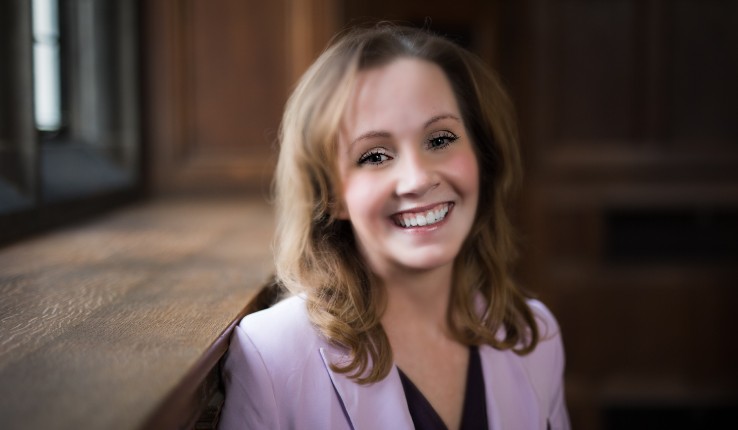“Central to Lehigh’s mission is to develop the leaders of tomorrow. Under Holona’s leadership, the Marcon Institute will ensure that Lehigh students are prepared as leaders who think critically about the problems of racism and inequality, and work with and within their communities to affect meaningful change,” said Nathan Urban, provost and senior vice president for academic affairs. “We are inspired by and grateful for the generosity of Charlie Marcon, whose gift has allowed this important university initiative to take shape.”
Said Donald Outing, vice president for equity and community: “We are absolutely thrilled that Dr. Holona Ochs has accepted this appointment to lead the Marcon Institute. Holona is a proven leader who is not afraid to engage in the difficult conversations associated with doing the antiracist work critical to creating lasting change. Our students and the broader Lehigh communities will benefit from Holona's leadership and the work of the Marcon Institute.”
Ochs’ vision for the Marcon Institute, which she calls “an investment in an antiracist future,” is rooted in the ideas of American writer and social activist bell hooks, with love and community as its organizing principles. The Marcon Institute, Ochs said, “will be a student-led intellectual community that values local knowledge and partners with organizations in the community with value alignment.” The Institute’s objectives are twofold: to foster student research that promotes research and progress toward racial and social justice, and to create programming with educational value to students and the Lehigh Valley community.
“We should really be thinking about what we can do as an institution of higher education to make benevolence more of a reality, or more believable to people at least,” Ochs said.
A Lifelong Mission
Ochs’ dedication to antiracism and social justice is rooted in her experiences as a member of a diverse extended family and the racism she witnessed her loved ones endure, she said.
“My mother’s family is Cherokee and Apache, so some members of my extended family have darker skin, and some have lighter skin,” she explained. “One of the things I learned or observed growing up is how differently I was treated because of my lighter skin. And so I've always been desperate to fix something I watched cause so much pain to people I love. It felt like for a long time there wasn't much I could do about it. And so I wasn't satisfied with that.”
What she could do was listen and learn, she said, and, as she got older, understand her privilege.
“[Today], what I'm trying to do is the same thing I've always tried to do, which is bring as much of that privilege to bear as I can to get people to stop using their privilege to hurt other people,” she said.
Ochs earned a bachelor’s degree in psychology and a master’s degree in clinical marriage and family therapy from Kansas State University. She then worked for several years as a therapist specializing in trauma-related disorders. Her experiences in that role, she said, drove her to pursue a different career path: “In the process of doing that work, I saw how many people—especially people living in poverty—were put in lose-lose situations by policy. So I've always been interested in bringing knowledge to bear to design policies that are less oppressive. That's what brought me to policy from working in the helping professions.”
She went on to earn both a doctorate and master’s degree in political science from the University of Kansas and, before she arrived at Lehigh in 2009, spent two years as an assistant professor of political science at Howard University. At Howard, Ochs worked with “some of the most brilliant intellectuals who nurtured my ability to both understand my privilege and antiracism in practice,” she said.
“I try really hard not to claim space that isn't mine, but to be present, to do the work of change, wherever I can see any opportunity to do that,” Ochs said. “Teaching and research are incredible privileges. To be able to work in the academy is a huge privilege. But I'm not happy unless I'm doing something with that privilege that's making other people's lives better, not just my own.”
Och’s research focuses on policy, and on what she describes as “the carceral right hand and the welfarist left hand of governance and how very often those two hands wash each other in the process of doing the work of government.” She has published in a wide range of peer-reviewed journals and is the author of Privatizing the Polity and co-author of Getting a Cut: A Contextual Understanding of Commission Systems and Gratuity: A Contextual Understanding of Tipping Norms from the Perspective of Tipped Employees.
Opportunities for Engagement & Impact
In a 2021 announcement of his gift to establish the Marcon Institute, Charles Marcon reflected on how the subject of racial discrimination and equality became more personal for him as a grandfather to four biracial grandchildren.
“That got me thinking about these issues and what I could do about them,” Marcon said. “It’s easy to recognize them globally or nationally, but one person with limited resources will not make any impact at that level. But locally, I certainly could have impact.”
Ochs’ vision for the Institute includes a wide range of opportunities for members of the Lehigh and local communities to participate in and facilitate events and programs that promote love, joy, inclusion, community-building, antiracism and social justice.
“All of these ideas are in development and will evolve, always centering the principles of a loving community,” Ochs said.
The Institute will also serve to enhance and amplify the efforts of those who have been working to promote racial and social justice on campus and in the community.
“I want to make sure that everything that the Marcon Institute does uplifts all of the antiracist work that people on campus have already been doing,” Ochs said. “It's important that the Marcon Institute not be a space that takes away from any of the things that are already going on in terms of antiracist work, but uplifts and amplifies it and finds connections among all of the different spaces on campus where antiracism work has already been going on.”
Ochs will spend the next several months meeting with individuals across Lehigh’s campus to discuss ideas for the Institute, formalize collaborations, and determine the things students can do “to contribute to antiracism in constructive ways that will motivate a lifelong commitment to antiracism not just in them, but the other people that they encounter in the process of doing their research and teaching,” she said.
Building a more antiracist society requires changes in policy and in what people believe, Ochs said, and she plans to connect students with activists at the local, state and federal levels to design programs that incrementally shift beliefs to allow for better policy.
“Currently, we're designing so much of policy on stereotypes and inaccurate assumptions about the so-called ‘other,’” Ochs explained. “It's leading us to a very degenerative place in political discourse. I think the Marcon Institute is the perfect place for us to start helping people adjust their lenses to reinforce the value of critical pedagogies. There are, I think, around 36 states that have considered legislation to outlaw critical pedagogies and inclusive practices. I see the Marcon Institute as a space to fight for truth.”
Although many of its programs will focus on undergraduate students, the Institute will welcome broad participation across campus and beyond: faculty, staff, graduate students, and the local community, Ochs said.
“I also want to change attitudes in all kinds of spaces: the public, private and nonprofit sectors, in the academy, and K through 12 education. So there's no space that I won't go into and there's nobody who will be told, ‘No, you can't participate in this,’” she said.
Lehigh students, Ochs said, are eager for this kind of work.
“We're in a period where we need to re-establish our commitments to one another. … Young people are going to be around much longer than I am, and they're going to carry this forward in a world where the nature of work is fundamentally changing, the nature of how we interact with each other is already changing at such a rapid pace. So I'm excited to see what ideas they have. I suspect they have some really innovative and insightful ideas for change.”






